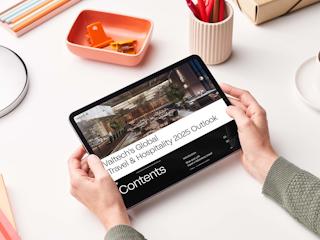The planning process plays a vital role in shaping the travel experience. And with the majority of travelers undecided when they start planning, the first moments of their online journey are your biggest opportunities to inspire.
Digital travel experience expectations are evolving
Today, almost all travel journeys begin online. Customer expectations are rapidly rising, fueled by the rise of AI-powered planning tools, emerging travel styles and a growing demand for ultra-curated, personalized experiences.
Meeting these expectations is key to differentiating your brand and driving results. When we overhauled Mandarin Oriental’s digital experience, for example, the transformation led to a 62% year-on-year increase in revenue.
This success didn’t happen by accident. It was built on a clear and strategic set of experience principles that every travel brand can use to elevate their digital presence.
What are experience principles?
Experience principles are user-centered guidelines that serve as a foundation for design and development across digital platforms. They ensure consistency, clarity and intention at every touchpoint.
Company leaders usually define experience principles, often with the help of partners like Valtech. They're informed by audience research, brand values and business goals — then turned into clear, actionable guidelines that teams can use to shape the full digital journey.
While experience principles offer structure and alignment, they’re not meant to be set in stone. They should evolve with shifting traveler behaviors and industry trends. They should flex based on context, whether someone is casually browsing for inspiration or ready to book, to ensure the experience stays relevant, seamless and effective.
One of the most iconic examples comes from Disney, which embeds the principle of “magic” across every interaction. Anyone designing a Disney experience knows it must feel magical. If it's mundane or uninspiring, it doesn't belong in the journey.
A starting point for travel brands developing experience principles
Digital travel experiences must be more than functional. They need to inspire action, feel intuitive and earn trust. That’s where experience principles come in.
While the specifics should reflect your brand’s identity and your audience’s unique needs, most successful travel brands anchor their principles in a few consistent areas that directly influence how travelers explore, decide and book.
Below are five high-impact themes any travel brand should address with their experience principles.
1. Inspire wonder and discovery
Trip planning is an adventure in itself, with 60% of travelers undecided on a destination when they start. Your digital experience should spark inspiration through storytelling, strong visuals and content that makes exploring easy and exciting. Here are a couple of examples:
-
Booking.com's AI Trip Planner, which helps undecided travelers by providing destination recommendations based on vague prompts like “I want a warm getaway in November.” This tool, paired with immersive photography and real traveler reviews, sparks inspiration and simplifies the discovery phase.
-
Airbnb's Icons program, which offers once-in-a-lifetime stays and experiences, such as spending the night in the Ferrari Museum or Shrek’s swamp. This campaign fuels the aspirational nature of travel and brings a storytelling element to the booking experience.
2. Make booking effortless
Over half (55%) of high-value travelers say an easy-to-use website is key to their decision to book. Strong principles should guide the design of seamless booking flows with minimal friction and distraction. If the user is ready to convert, your experience shouldn’t slow them down.
3. Personalize the experience
Travelers expect websites to respond to their preferences and intent. Brands that invest in personalization see 10–15% higher conversion rates. A strong principle here ensures you surface relevant content, offers and support at the right moments for every user.
One emerging opportunity is intelligent site search. As travelers enter increasingly conversational queries, modern search tools — often powered by AI — can return more relevant results, understand intent and eliminate dead ends.
Marriott Bonvoy are already applying this technology on the brand’s vacation rental platform, Homes & Villas by Marriott Bonvoy.
The generative AI-powered search experience lets users find homes using natural language prompts like “a beach house for a family of five with a pool and a grill.” This capability not only makes search more intuitive but surfaces more relevant options that match the user’s true intent.
4. Build trust through clarity
Users need reassurance that their bookings are secure, their travel information is accurate and that customer support is easily accessible.
Almost one-in-five (19%) consumers will abandon the checkout process if they don’t trust the website. Price transparency, clear cancellation policies and visible security features all build traveler confidence. This is often more critical for emerging brands than for well-established ones, who have built-in trust.
5. Express the brand in key moments
Your experience principles should articulate how your brand’s identity comes through across the digital journey — in visuals, tone, attitude and interaction. Consider including a principle that captures your core brand essence and reinforces what sets you apart from competitors. Here are two examples:
-
Virgin Atlantic’s playful UX copy. Virgin Atlantic brings its brand personality into digital interactions with friendly, unexpected copy (“Let’s jet, set, go!” on checkout pages) and fun loading animations.
-
Standard Hotels’ cool factor. The Standard’s website reflects its edgy, culture-driven brand through bold design choices, playful language and curated city guides that position the hotels as lifestyle hubs.
Make it your own with Valtech
These five areas offer a strong foundation, but the best experience principles are the ones that reflect your brand, your audience and your goals.
At Valtech, we work with travel brands to develop tailored principles that turn strategy into real results. Arrange a time to chat using the contact form below. Or check out our latest work and read our Travel & Hospitality Outlook to learn where we see the industry heading next.










